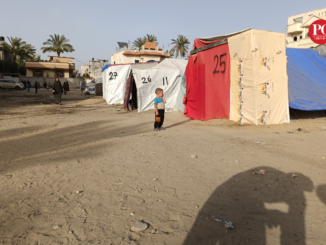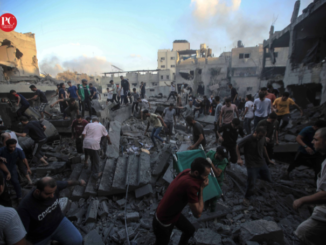
Israel’s decision to block humanitarian aid to Gaza has sparked widespread condemnation from Arab countries, with Saudi Arabia and Egypt denouncing it as a violation of international law and the ceasefire agreement.
Arab leaders have condemned Israel’s decision on Sunday to block humanitarian aid from entering Gaza, calling it a blatant violation of the ceasefire agreement and international law.
Earlier, the office of Israeli Prime Minister Benjamin Netanyahu issued a statement announcing that “as of this morning, all entry of goods and supplies into the Gaza Strip will cease.”
The announcement came at the conclusion of Phase 1 of the ceasefire agreement which took effect on January 19.
Hamas slammed Netanyahu’s decision to halt humanitarian aid as “a cheap act of blackmail, a war crime, and a blatant violation of the agreement.”
‘Collective Punishment’ – Saudi Arabia
The Saudi Foreign Ministry expressed its “condemnation and denunciation” of Israel’s decision.
“The use of aid as a tool for extortion and collective punishment constitutes a blatant violation of international law and a direct infringement of the basis of international humanitarian law, especially in light of the humanitarian catastrophe facing the Palestinian people.”
#Statement | The Foreign Ministry expresses the Kingdom of Saudi Arabia’s condemnation and denunciation of the Israeli occupation government’s decision to halt the access of humanitarian aid into the Gaza Strip. pic.twitter.com/OPQsjW9Rfp
— Foreign Ministry
(@KSAmofaEN) March 2, 2025
‘Blatantly Violate Ceasefire’ – Egypt
Egypt also condemned Israel’s blocking of humanitarian aid, calling it a “flagrant violation” of the ceasefire agreement.
In a statement, the country’s Foreign Ministry said that it “strongly condemns the Israeli government’s decision to block humanitarian aid and close crossings used for relief efforts,” the Anadolu news agency reported.
The ministry asserted that “these actions blatantly violate the ceasefire agreement, international humanitarian law, the Fourth Geneva Convention, and all religious principles.”
The Fourth Geneva Convention, adopted in August 1949, provides humanitarian protections for civilians in war zones.
Egypt stressed that “there is no justification, condition, or rationale that permits the use of starvation and siege as a weapon against innocent civilians, particularly during (the Muslim fasting month of) Ramadan.”
Cairo called on the international community to “fulfill its responsibilities to end all unlawful and inhumane practices targeting civilians and to condemn attempts to use innocent lives for political leverage.”
‘Risks Reigniting Conflict’ – Jordan
Jordan’s Foreign Ministry also strongly condemned Israel’s decision as a “blatant breach of international law and the Fourth Geneva Convention on the protection of civilians during war.”
Foreign Ministry spokesperson Sufyan Qudah said “the Israeli government’s decision represents a grave violation of the ceasefire agreement and risks reigniting the conflict in Gaza,” Anadolu reported.
Qudah stressed that “Israel must end its use of starvation as a weapon against Palestinians and innocent civilians, especially during the holy month of Ramadan.”
He urged the international community to “uphold its legal and moral responsibilities by compelling Israel to abide by the ceasefire agreement, implement all its phases, and reopen crossings to ensure the delivery of humanitarian aid across Gaza, which is facing an unprecedented humanitarian crisis.”
‘Weapon of War’ – Qatar
Qatar’s Foreign Ministry strongly condemned Israel’s decision, saying it “considered it a clear violation of the ceasefire agreement, international humanitarian law, the Fourth Geneva Convention, and all religious principles.”
The ministry emphasized its “firm rejection of using food as a weapon of war and the deliberate starvation of civilians.”
Qatar called on the international community “to hold Israel accountable and ensure the safe, continuous, sustainable and unhindered delivery of humanitarian aid to all parts of the Gaza Strip.”
Statement | Qatar strongly condemns the Israeli occupation government’s decision to halt the entry of humanitarian aid into the Gaza Strip#MOFAQatar pic.twitter.com/FnQ6VnuYF1
— Ministry of Foreign Affairs – Qatar (@MofaQatar_EN) March 2, 2025
Hamas urged mediators and the global community “to pressure the occupation to stop its punitive and immoral measures against more than two million people in Gaza.”
The first six-week phase of the ceasefire agreement, which took effect on January 19, officially ended at midnight on Saturday. However, Israel has not agreed to move forward to the second phase of the deal to bring an end to the war in Gaza.
Netanyahu had sought to extend the initial exchange phase to secure the release of as many Israeli captives as possible without offering anything in return or fulfilling the military and humanitarian obligations of the agreement.
Netanyahu’s stance drew sharp criticism from the families of captives, politicians and regional governments.
Yair Golan, the leader of the Democrats Party, accused Netanyahu’s government of evading negotiations on the second phase of the agreement, Anadolu reported.
Hamas Appeals to Mediators
Hamas has refused to proceed under these conditions, insisting that Israel abide by the terms of the ceasefire and immediately start negotiations for the second phase, which includes a full Israeli withdrawal from Gaza and a complete halt to the war.
“The war criminal Netanyahu is trying to impose political realities on the ground that his fascist army has failed to establish over fifteen months of brutal genocide,” Hamas emphasized. “He seeks to overturn the signed agreement for his narrow internal political interests, at the expense of the occupation’s captives in Gaza and their lives.”
The movement reaffirmed that Netanyahu and his government’s actions “are in clear violation of Article 14 of the agreement, which states that all procedures of the first phase will continue into the second phase, and that the guarantors will make every effort to ensure that negotiations proceed until an agreement is reached on the conditions for implementing the second phase.”
The ceasefire agreement has halted Israel’s genocidal war on Gaza, which has killed more than 48,000 people, mostly women and children, and wounded more than 111,000.
(PC, Anadolu)









Be the first to comment